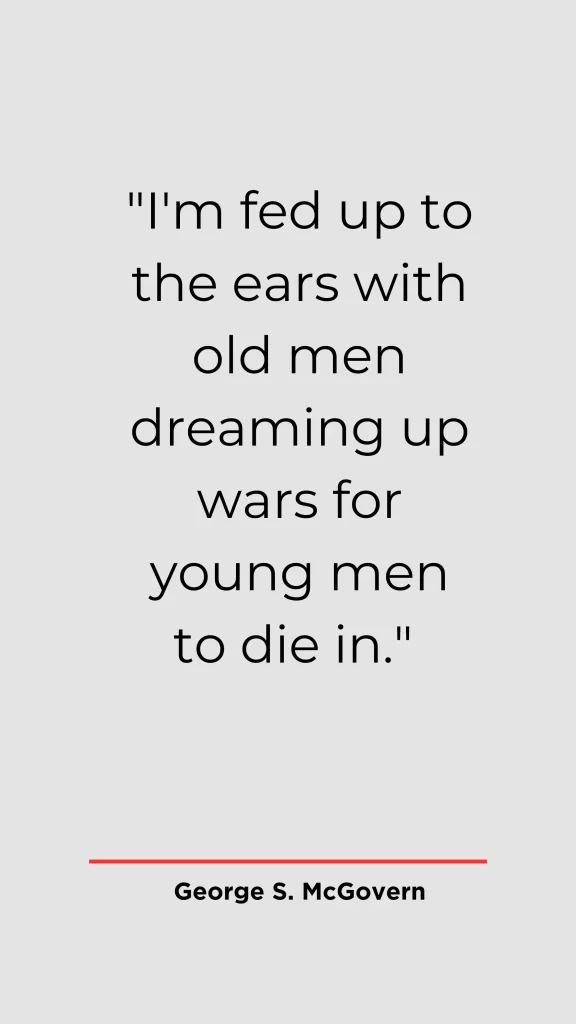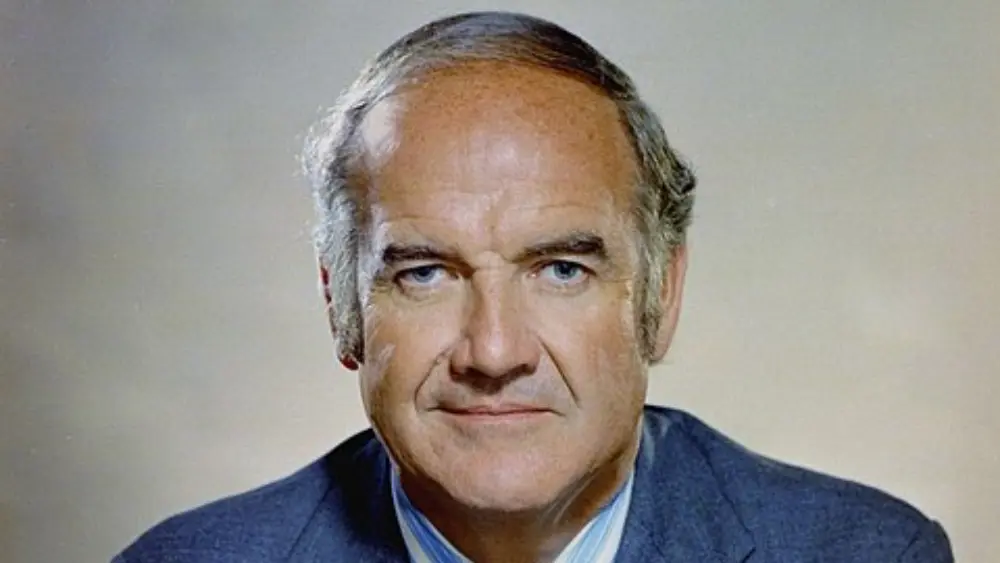George Stanley McGovern, born on July 19, 1922, in Avon, South Dakota, was a dedicated American statesman whose life was defined by a profound commitment to public service. McGovern’s political career spanned several decades and was marked by his passionate advocacy for social justice, civil rights, and an end to hunger.
Early Life and Military Service
McGovern’s formative years were shaped by hardship. He grew up during the Great Depression, a period marked by widespread economic suffering, unemployment, and uncertainty. His father, a Methodist minister, earned a modest income, and the family experienced the same economic anxieties that gripped millions of Americans.
Yet it was these challenging circumstances that instilled in young George a lasting sense of empathy for the struggles faced by the less fortunate. The stories he heard from neighbors about losing farms, missing meals, or watching dreams vanish beneath the weight of the Depression had a profound impact. These early experiences laid the foundation for a worldview rooted in the belief that government has a responsibility to care for the vulnerable and create a more just society.
McGovern excelled academically and found inspiration in literature and debate. He attended Dakota Wesleyan University, where he developed an early interest in history and public speaking—skills that would serve him well in his future political career.
A Wartime Transformation
With the onset of World War II, George McGovern answered the call to service. He joined the United States Army Air Forces and became a B-24 bomber pilot, assigned to the European theater. Over the course of the war, McGovern flew 35 combat missions over Germany and occupied Europe. His missions were often harrowing—his plane was hit repeatedly by enemy fire, and he narrowly escaped disaster more than once.
The experience of war left a remarkable effect. McGovern witnessed firsthand the devastation, suffering, and loss inflicted by conflict. He returned home deeply committed to peace and convinced of the futility of war as a means to resolve human disputes. This conviction would shape his approach to foreign policy and guide his resolute opposition to the Vietnam War decades later.
For his bravery, McGovern received the Distinguished Flying Cross, a testament to his courage and sense of duty. But he often downplayed his heroism, reflecting instead on the war’s tragic costs and the importance of building a more peaceful world.
Post-War Education and Entry into Politics
After returning from Europe, McGovern took advantage of the G.I. Bill, which enabled thousands of returning veterans to pursue higher education. He enrolled at Northwestern University, earning a Ph.D. in history and government. His studies deepened his understanding of American democracy, international relations, and the role of social policy in shaping people’s lives.
McGovern began teaching history and political science, but he soon found himself drawn to public life. His wartime experiences and academic pursuits merged with his passion for social justice, leading him to join the Democratic Party. In the early 1950s, he became involved in local politics and quickly distinguished himself as a principled voice unafraid to challenge entrenched interests.
His early political activism set the stage for what would become a long and influential career in public service.
Rising Through the Ranks: Congress and the Senate
In 1956, George McGovern took a decisive step onto the national stage when he was elected to the U.S. House of Representatives, representing South Dakota. From the outset, he made clear that he intended to champion policies that lifted people out of poverty. He also worked to protect their fundamental rights. His first term was marked by a commitment to civil rights. At the time, advocating for racial equality was often politically risky.
McGovern also became known as a tireless advocate for rural communities and family farmers—constituencies he understood intimately from his upbringing in South Dakota. He championed measures to improve agricultural policy and ensure that farmers had access to fair prices and markets.
His focus on fighting hunger was evident early on. He believed that no child in the United States—or anywhere in the world—should go to bed hungry, and he consistently worked to expand food assistance programs.
In 1962, McGovern was elected to the U.S. Senate, where he would serve for 18 years. During this time, he emerged as one of the Senate’s most passionate voices for progressive reform, civil rights, and international cooperation.
The Fight Against Hunger: Food for Peace
Among McGovern’s most significant achievements was his pioneering work in addressing global hunger. As a member of Congress, he co-authored the Food for Peace program—legislation that provided surplus American agricultural products to countries struggling with famine and poverty. This initiative, signed into law by President Dwight D. Eisenhower, reflected McGovern’s deep belief that food security was both a moral imperative and a cornerstone of global stability.
In 1961, President John F. Kennedy appointed McGovern as the first director of the Food for Peace program. In this role, McGovern oversaw the distribution of millions of tons of food aid worldwide. He approached the position with the same compassion and diligence that defined his legislative work. He traveled extensively to better understand the challenges faced by recipient nations and to ensure that aid reached those most in need.
Under McGovern’s leadership, Food for Peace expanded rapidly and became a model for how American agricultural abundance could be harnessed to address suffering and promote peace.
The Vietnam War and Moral Opposition
Throughout the 1960s, the Vietnam War escalated, dividing the country and costing thousands of lives. McGovern emerged as one of the Senate’s most forceful critics of the war. He viewed the conflict as an unjust and unnecessary intervention that drained American resources and undermined U.S. credibility. It also inflicted untold suffering on both American soldiers and Vietnamese civilians.
Furthermore, McGovern opposed the war on principle, drawing on his experiences in World War II. He believed the military should act only as a last resort. McGovern delivered powerful speeches condemning the conflict. The media widely covered his statements, and he emerged as a leading figure in the growing anti-war movement.
Though his stance was controversial, it solidified his reputation as a leader willing to take political risks to uphold his convictions.
The 1972 Presidential Campaign
In 1972, George McGovern announced his candidacy for President. He built his campaign on a platform to end the Vietnam War, reduce defense spending, and invest in social programs to fight poverty and inequality. McGovern also proposed reforms aimed at expanding civil rights, protecting the environment, and creating a fairer tax system.
He won the Democratic nomination after a spirited primary season. However, his campaign faced immense challenges, including divisions within the Democratic Party and attacks from conservative opponents. The lingering impact of the Chappaquiddick incident involving his first choice for vice president, Thomas Eagleton, added further complications.
Despite these hurdles, McGovern’s message resonated with millions of Americans who were weary of war and eager for progressive change. He ultimately lost the general election to Richard Nixon in a landslide. However, his candidacy left a profound imprint on American politics, inspiring a generation of activists and demonstrating the power of principled campaigns.
Later Political Career and Ongoing Advocacy
Following the 1972 election, McGovern continued to serve in the Senate until 1981. He remained an advocate for farmers, low-income families, and working-class Americans. His legislative efforts focused on nutrition programs, including school lunch initiatives and food stamps. These programs helped millions of children and families access healthy meals.
In 1984, he launched a second bid for the presidency, seeking the Democratic nomination. Though he did not win, his campaign reaffirmed his lifelong commitment to advancing progressive ideals.
McGovern eventually left elected office but never retreated from public life. Instead, he turned his focus to humanitarian work, becoming a global ambassador in the fight against hunger.
A Champion Against Hunger
After leaving the Senate, McGovern co-founded the Food Research and Action Center and continued to advocate internationally for policies to end hunger. He was appointed the United Nations Global Ambassador on World Hunger, a role that took him around the globe to raise awareness, secure funding, and mobilize action to combat food insecurity.
He authored several books on foreign policy, hunger, and his experiences in politics, sharing his insights with new generations of activists and leaders.
McGovern’s tireless efforts earned him the Presidential Medal of Freedom in 2000, one of the nation’s highest civilian honors, recognizing his lifelong dedication to humanitarian causes.

George S. McGovern: Legacy
George S. McGovern’s life stands as a powerful testament to the impact one individual can have in the pursuit of justice and compassion. From the skies over Europe during World War II to the halls of the Senate and the world’s most impoverished communities, McGovern devoted himself to fighting for those whose voices too often went unheard.
His legacy endures not only in the policies he helped enact but in the spirit of service and conviction he inspired. As America continues to grapple with inequality, conflict, and the challenge of feeding a growing population, McGovern’s example reminds us that leadership rooted in empathy and principle remains as vital as ever.
In the end, George S. McGovern was more than a politician—he was a champion of humanity, a voice for the marginalized, and a tireless advocate for a more peaceful and just world.








